User Engagement and Activism On the daca Hashtag: An Analysis of Tweets
| dc.provenance | El documento original impreso/digital se encuentra en resguardo del Centro de Investigaciones sobre América del Norte de la Universidad Nacional Autónoma de México. Proyecto CISAN, Memoria Institucional. | |
| dc.rights.license | http://ru.micisan.unam.mx/page/terminos | |
| dc.coverage.spatial | Norteamérica | |
| dc.coverage.temporal | Siglo XXI | |
| dc.creator | Rao, Sandhya | |
| dc.creator | Carter, Daniel | |
| dc.creator | Higgins Joyce, Vanessa | |
| dc.creator | Eung Jeong, Lee | |
| dc.date.accessioned | 2025-06-20T21:34:36Z | |
| dc.date.available | 2025-06-20T21:34:36Z | |
| dc.date.issued | 2022 | |
| dc.identifier.issn | 1870-3551 | |
| dc.identifier.uri | https://ru.micisan.unam.mx/handle/123456789/1683 | |
| dc.description.abstract | El programa Acción Diferida para los Llegados en la Infancia (daca, por sus siglas en inglés) impacta directamente a alrededor de 700 000 personas que residen en Estados Unidos, la mayoría de las cuales inmigraron desde México. Esta investigación presenta un análisis de con- tenido de los tweets del hashtag daca en tres días cruciales relacionados con la finalización de dicho programa, y examina los usos del hashtag de las partes interesadas, así como su interac- ción con éste. Los resultados mostraron diferencias significativas en el nivel de participación de las diversas partes interesadas, pero no entre aquellos que apoyaron, se opusieron o fueron neutrales hacia el daca. Sin embargo, hubo diferencias entre las partes interesadas, así como entre los grupos, en lo que respecta al llamado a la acción. Este estudio proporciona una mejor comprensión de la participación y el activismo de los usuarios a través de Twitter en el debate público que podría tener como resultado cambios en la política. | |
| dc.description.abstract | Deferred Action for Childhood Arrivals (daca) directly impacts about 700,000 people residing in the United States, most of whom immigrated from Mexico. This research presents a content analysis of tweets from the daca hashtag on three crucial days pertaining to ending daca, ex- amining stakeholders’ uses of the hashtag and their engagement with it. Results showed sig- nificant differences in the level of engagement by different stakeholders but not between those who supported, opposed or were neutral toward daca. However, there were significant differ- ences between the different stakeholders, as well as between the groups, with regards to call to action. The study provides a better understanding of user engagement and activism via Twitter in public debate that could potentially result in policy changes. | |
| dc.format | ||
| dc.format.extent | pp.167-190 | |
| dc.language.iso | Spa | |
| dc.publisher | Universidad Nacional Autónoma de México, Centro de Investigaciones Sobre América del Norte | |
| dc.relation.requires | Lector PDF. | |
| dc.title | User Engagement and Activism On the daca Hashtag: An Analysis of Tweets | |
| dc.rights.holder | Universidad Nacional Autónoma de México | |
| dc.audience | Estudiantes | |
| dc.audience | Maestros | |
| dc.audience | Investigadores | |
| dc.audience | Medios de comunicación | |
| dc.audience | Otros públicos | |
| dc.description.extract | This research conducts a content analysis of random samples of tweets from the daca hashtag on March 5, 2018, the day daca was supposed to end and congress was supposed to come up with a replacement policy (Cruz, 2018), as well as a day before and a day after. While discussion on this divisive issue ensued for the next couple of months up until the end of April, when a federal judge ordered the continuation of daca (Sacchetti, 2018), the March 5th date was pivotal in organizing supporters and opposers in a social media realm. This study investigates the uses surrounding daca hashtag, analyzing engagement of stakeholders (individuals, media organizations, private organizations and the government) and those who oppose, support or remain neutral (groups) of the policy. The study also examines activism or call to action by stakeholders and groups. Applying the uses and gratifications theory, this study ex- amines the use of features, such as attaching links, hashtags and visual media, by different stakeholders and groups in the context of the debate. | |
| dc.relation.issue | No. 1 (33) | |
| dc.relation.volume | Vol. 18 | |
| dc.rights.accesslevel | openAccess | |
| dc.title.parallel | Participación y activismo de usuarios en el hashtag dAcA un análisis de los tweets | |
| dc.type.spa | Research article | |
| dc.date.copyrighted | 2022 | |
| dc.type.coar | http://purl.org/coar/resource_type/c_2df8fbb1 | |
| dc.coverage.placeOfPublication | México | |
| dc.subject.keywordSpa | ||
| dc.subject.keywordSpa | daca | |
| dc.subject.keywordSpa | usos y gratificaciones | |
| dc.subject.keywordSpa | activismo | |
| dc.subject.keywordSpa | compromiso con las redes sociales | |
| dc.subject.keywordEng | ||
| dc.subject.keywordEng | daca | |
| dc.subject.keywordEng | uses and gratifications | |
| dc.subject.keywordEng | activism | |
| dc.subject.keywordEng | social media engagement | |
| dc.audience.educationLevel | Superior | |
| dc.audience.educationLevel | Posgrado | |
| dc.identifier.handle | Rao, Sandhya, Daniel Carter, Vanessa Higgins Joyce y Lee Eung Jeong, "User Engagement and Activism On the daca Hashtag: An Analysis of Tweets", Norteamérica. Revista Académica del CISAN-UNAM, Universidad Nacional Autónoma de México, Centro de Investigaciones sobre América del Norte, 2022, año 16, no. 1 (33), (enero-junio): 139-165. |
Files in this item
This item appears in the following Collection(s)
-
Artículos [469]
MiCISAN, Repositorio Institucional
Hecho en México, todos los derechos reservados 2018. Esta página puede ser reproducida con fines no lucrativos, siempre y cuando no se mutile, se cite la fuente completa y su dirección electrónica. De otra forma, requiere permiso previo por escrito de la institución.
Sitio Web administrado por: Centro de Investigaciones sobre América del Norte • micisan@unam.mx







